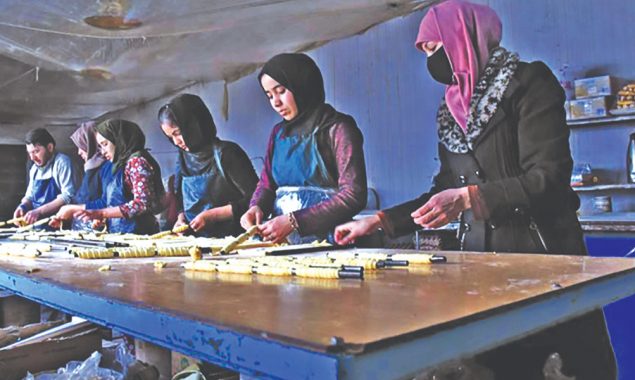
MAZAR-I-SHARIF – Contrary to alleged reports of women being confined to home under Afghanistan’s Taliban administration, nearly a dozen women and girls are seen hard at work in a confectionery shop in the northern city of Mazar-I-Sharif.
The owner of the shop, Sayed Abas, told Xinhua that 10 women and girls work there regularly, making cakes and biscuits. “The ladies working here have had no problems resuming work. We all enjoy working here,” said Habiba Amini, one of the sweet makers.
Amini said that Mayor of Mazar-i-Sharif Mawlawi Qudratullah Tareq had visited the store to show his support for working women. The mayor rejected reports of women being beaten and confined to their houses by authorities, saying, and “Women have the right to work.”
The Taliban administration has, however, barred women from working in some government entities and has stopped girls from attending school beyond grade seven. In Kabul, spokesman Zabihullah Mujahid said schools for girls would open in the new school year, which begins in March.
Following the abrupt withdrawal of U.S.-led forces in August 2021, Washington has imposed sanctions on the embattled country, seizing Afghan assets and compounding the poverty brought by 20 years of foreign occupation. Women are an important part of what workforce remains amid the devastation in Afghanistan, most notably in health, schools and retail. Mother of two Adalat Bahri is a manager of the Rabia Balkhi market, a bazaar for women who run their own businesses including confectioners, shoe shops, restaurants and handicrafts. “I have been working for here for two years and make enough to support my family,” she told Xinhua.
“Finding a job today is very difficult, even for men. I feel lucky to have a regular job and income,” she said. “I want to see women working and jobs are provided for people who are hungry in the country.”
According to Human Rights Watch, since taking control of the city of Ghazni on August 12, 2021, days before entering Afghanistan’s capital, Kabul, the Taliban have imposed rights-violating policies that have created huge barriers to women’s and girls’ health and education, curtailed freedom of movement, expression, and association, and deprived many of earned income. Afghanistan’s rapidly escalating humanitarian crisis exacerbates these abuses. Following the Taliban takeover, millions of dollars in lost income, spiking prices, aid cut-offs, a liquidity crisis, and cash shortages triggered by former donor countries, especially the United States, have deprived much of the population of access to food, water, shelter, and health care.
“Afghan women and girls are facing both the collapse of their rights and dreams and risks to their basic survival,” said Halima Kazem-Stojanovic, a core faculty member of SJSU’s Human Rights Institute and a scholar on Afghanistan. “They are caught between Taliban abuses and actions by the international community that are pushing Afghans further into desperation every day.”
Human Rights Watch and SJSU remotely interviewed 10 women currently or recently in Ghazni province, including those who had worked in education, health care, social services, and business, and former students.
They described spiraling prices for food staples, transportation, and schoolbooks, coupled with an abrupt and often total income loss. Many had been the sole or primary wage earner for their family, but most lost their employment due to Taliban policies restricting women’s access to work. Only those working in primary education or health care were still able to work, and most were not being paid due to the financial crisis.
The Taliban have banned women and girls from secondary and higher education, and altered curricula to focus more on religious studies. They dictate what women must wear, how they should travel, workplace segregation by sex, and even what kind of cell phones women should have. They enforce these rules through intimidation and inspections.
Courtesy: Xinhua, HRW
Read More News On
Catch all the International News, Breaking News Event and Latest News Updates on The BOL News
Download The BOL News App to get the Daily News Update & Follow us on Google News.




